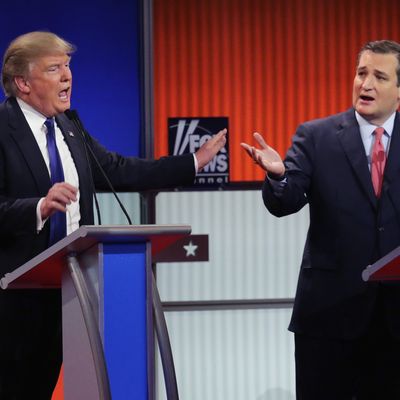
Donald Trump’s candidacy has carved a gulf down the middle of the Republican Party. But the divide is not formed by the elemental us-versus-them appeal that lies at the heart of Trump’s unbreakable connection with the Republican base. Look at the way traditional conservatives have framed their attacks on him. Anti-Trump conservatives relentlessly describe Trump as “center left” or “liberal.” They run ads attacking him for his past rhetorical support for universal health insurance, ignoring his current rock-solid Republican positioning. Conservatives attack Trump as a liberal because they have given up on fighting his ultranationalist appeal, or else never cared to oppose it in the first place. This new reality can be seen in the wake of the Brussels bombings, in which the divided Republican Party speaks with one voice.
Following the attacks, Trump renewed his calls for expanded torture and excluding Muslim immigrants. Ted Cruz, not to be outflanked on the right, began with his customary denunciation of President Obama for refusing to use sufficiently inflammatory terms to identify the enemy (“we can never hope to defeat this evil so long as we refuse to even name it”). Sensing this might not be enough, he unveiled a new commitment, to “empower law enforcement to patrol and secure Muslim neighborhoods before they become radicalized.” This is a breathtaking idea that merits deeper examination as evidence of what is now the policy stance of the putatively non-crazy candidate of one of our two major parties.
The great benefit enjoyed by the United States over Europe is its multicultural character, in which citizenship is not identified with a racial group. That multiculturalism has allowed American Muslims to assimilate much more easily than in Europe, which makes Americans safer — though not, of course, perfectly safe — from terrorism. Looking at this state of affairs, with a dangerous, ghettoized European Muslim population and a much less threatening, well-assimilated American Muslim population, Cruz proposes to treat American Muslims like European ones. He endorses racial profiling of “Muslim neighborhoods.”
Cruz does not even justify this policy as a response to radicalization. He proposes to do so, in his words, “before they become radicalized.” Cruz’s belief is that subjecting a non-radicalized population to discriminatory policing will prevent rather than cause its radicalization.
This is the kind of madness that now prevails for foreign-policy logic in this party. Cruz, of course, has appointed raging paranoic Frank Gaffney as a foreign-policy adviser. Gaffney has called Barack Obama “America’s first Muslim president.” Perhaps Cruz envisions the special law patrols to include the neighborhood of 1600 Pennsylvania Avenue, to prevent the (further) radicalization of its Muslim occupant.
Meanwhile, the party’s most cosmopolitan and respected figure, House Speaker Paul Ryan, delivered a speech today that he billed as a “stand in defense of religious liberty.” One might think Ryan would have in mind the liberty of law-abiding Muslim-Americans not to be singled out for their religious faith. But, no, Ryan did not say anything about that. “Religious liberty” is a Republican term of art that describes the prerogatives of the majority religion, the persecution of which ranges from Obamacare to the war on Christmas.
In Europe, ethnically homogenous Christian populations have been unable to assimilate immigrant populations, with disastrous results. The Republican Party now appears doctrinally bound to replicate that failure.






























